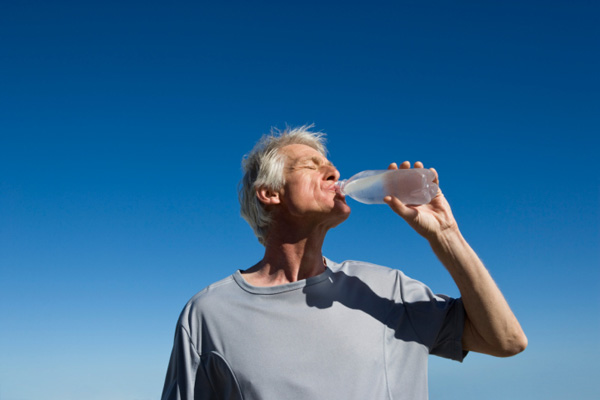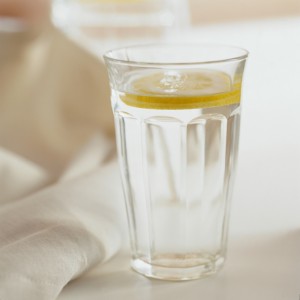Staying Hydrated

With the warm weather here, it’s especially important to drink plenty of fluids and keep yourself hydrated. The human body is made up of about 70 percent water; water is needed for many bodily functions, including digestion, regulating body temperature, blood pressure and heart rate. The kidneys also require water to remove waste products from the body.
What causes dehydration?
Dehydration occurs when you don’t take in enough fluids, or when you lose excess fluids without replacing them. Causes of dehydration include exercising in hot weather, fever, vomiting or diarrhea, and excessive sweating. If you have diabetes and you have high blood sugars, you can also become dehydrated if your body tries to get rid of excess sugar, or glucose, through increased urination. Older people may become dehydrated because they often lose the ability to sense when they’re thirsty, so they may not drink enough fluids.
What are symptoms of dehydration?
You may be dehydrated if you have any of these symptoms:
- Dry mouth
- Thirst
- Decreased urination
- Feelings of weakness or fatigue
- Constipation
- Dry skin
- Headache
- Dizziness or lightheadedness
- Mood changes
One way to tell if you’re dehydrated is to look at the color of your urine. Your urine should be a pale yellow color. If it’s dark yellow or light brown, you probably aren’t drinking enough fluids.
How much fluid should you drink?
You lose water every day just by breathing, perspiring, urinating, and through bowel movements. It’s important to drink enough fluids (preferably water) to replace these losses. While you may have heard the advice to drink eight 8-ounce cups of water every day, there’s no scientific agreement on how much fluid you actually need. The Institute of Medicine recommends that a daily “adequate intake” of fluids is 13 cups for men and 9 cups for women. But aiming for those 8 cups per day isn’t bad if it helps you to remember to drink!
You might need more than 9 or 13 cups of fluid daily if you live in a hot climate, exercise heavily, are ill with fever, vomiting or diarrhea, or are pregnant or breastfeeding. Your doctor can advise you on how much fluid to drink.
What counts as fluid?
 Not a big fan of water? That’s okay, as there are plenty of other beverages to choose from. Even beverages that contain caffeine, like coffee and tea, “count” towards your daily fluid needs. Milk, juice, sports drinks, soda, and lemonade can all help you stay hydrated. However, if you have diabetes or are watching your waistline, avoid or at least limit the number of drinks that contain sugar as they can raise your blood sugar and lead to weight gain. Instead, choose water, seltzer water, unsweetened ice tea or diet soft drinks.
Not a big fan of water? That’s okay, as there are plenty of other beverages to choose from. Even beverages that contain caffeine, like coffee and tea, “count” towards your daily fluid needs. Milk, juice, sports drinks, soda, and lemonade can all help you stay hydrated. However, if you have diabetes or are watching your waistline, avoid or at least limit the number of drinks that contain sugar as they can raise your blood sugar and lead to weight gain. Instead, choose water, seltzer water, unsweetened ice tea or diet soft drinks.
Can any foods count as fluid?
You might be surprised to learn that about 20 percent of our daily fluid needs can come from fruits and vegetables. Fruits and vegetables that are at least 90 percent water include:
- Cucumbers
- Lettuce
- Celery
- Tomatoes
- Broccoli
- Cantaloupe
- Watermelon
- Grapefruit

